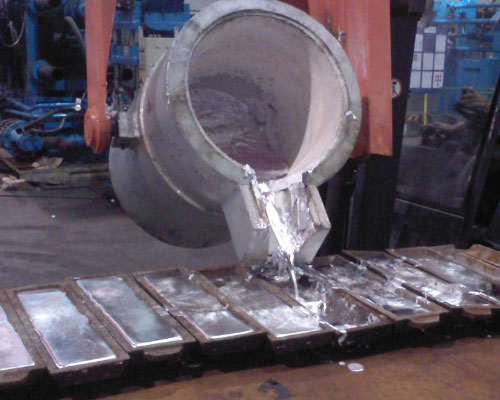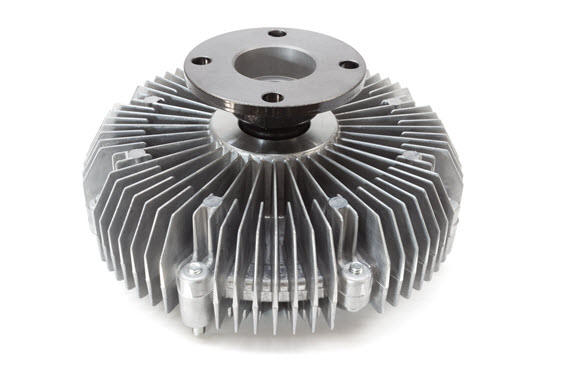The Essential Usages of Aluminum Foundry in Various Industries and Their Influence
Aluminum factories work as a crucial resource within various markets. Their lightweight and resilient products significantly enhance performance in vehicle, aerospace, building, and electronics markets. As each industry leverages aluminum's one-of-a-kind properties, they additionally contribute to sustainability efforts. This diverse effect motivates a deeper exploration of exactly how Aluminum shaped these sectors. What certain developments and benefits develop from its use?
Automotive Sector Applications
The automotive market progressively relies upon Aluminum Foundry applications to improve vehicle performance and efficiency. Aluminum's light-weight nature adds significantly to fuel economic climate, making it a favored option for producers aiming to reduce emissions and improve total automobile dynamics. Elements such as engine blocks, transmission housings, and wheels are typically produced via Aluminum spreading procedures, enabling elaborate layouts that fulfill strenuous security and performance criteria.

Aerospace Innovations

The use of aerospace-grade Aluminum alloys enhances resistance to corrosion and fatigue, crucial for the demanding environments airplane face. Advancements in additive production additionally enable for fast prototyping and modification of parts, lowering lead times and costs.
Construction and Infrastructure
While the building and infrastructure markets continue to advance, Aluminum shops are increasingly identified for their contributions to modern-day structure practices. Aluminum's lightweight nature and high strength make it an optimal material for numerous architectural applications. Factories provide components such as beam of lights, frameworks, and frontages that improve the resilience and longevity of structures and facilities projects.
Light weight aluminum's corrosion resistance plays a vital duty in extending the lifespan of structures exposed to extreme environmental conditions. The power efficiency of Aluminum items likewise lines up with sustainable building initiatives, contributing to lower power consumption in construction. Furthermore, ingenious spreading methods have expanded the style opportunities, permitting designers and engineers to develop cosmetically pleasing yet functional frameworks.
Electronic devices Production
Aluminum shops play a substantial function in the electronics manufacturing sector, where the demand for lightweight and thermally conductive materials is paramount. Aluminum Foundry. Components such as warmth sinks, coverings, and braces are often produced using Aluminum as a result of its superb thermal residential or commercial properties and capacity to dissipate warm properly. This is essential in digital gadgets, where overheating can bring about failing and reduced efficiency
The flexibility of Aluminum enables intricate layouts and precise machining, which are essential in modern electronic devices. In addition, light weight aluminum's non-magnetic homes make it suitable for applications in sensitive digital tools, reducing disturbance. Moreover, light weight aluminum's resistance to deterioration boosts the sturdiness of digital parts, making sure long life and dependability.
Sustainability and Recycling Initiatives
Given the raising focus on ecological obligation, the Aluminum Foundry market has made significant strides in sustainability and reusing efforts. Aluminum is naturally recyclable, allowing shops to recover and recycle material with minimal power expense contrasted to key production. This closed-loop recycling procedure not just decreases waste but likewise decreases greenhouse gas emissions, adding to a link more lasting manufacturing design.
Numerous shops are adopting energy-efficient innovations, consisting of renewable power resources, to power their procedures. This shift not just reduces reliance on nonrenewable fuel sources but likewise boosts general operational performance
Market collaborations are additional promoting sustainable techniques, such as sharing ideal practices and establishing ingenious reusing approaches. By focusing on these initiatives, the Aluminum Foundry field is placing itself as a leader in sustainable production, straightening with global targets for sustainability while meeting the demands of different sectors.

Regularly Asked Inquiries
What Are the Main Benefits of Using Aluminum in Foundry Processes?
The primary benefits of using Aluminum in Foundry processes include its light-weight nature, exceptional deterioration resistance, high thermal and electric conductivity, and convenience, enabling intricate designs and reliable recycling, inevitably try here improving total production efficiency and decreasing costs. - Aluminum Castings
How Does Aluminum Foundry Impact Item Lifecycle Monitoring?
Aluminum Foundry greatly enhances item lifecycle management by making it possible for reliable product use, decreasing waste, and promoting recycling. Its lightweight buildings enhance transport effectiveness, while resilience expands product lifespan, ultimately adding to sustainability and cost-effectiveness in production.
Are There Specific Difficulties in Aluminum Foundry Production?
Particular obstacles in Aluminum Foundry production include managing temperature control, making sure material quality, decreasing waste, and adjusting to changing market demands. These elements can influence performance, price, and general competitiveness within the industry.
What Precaution Are Necessary in Aluminum Foundry Workflow?
Important precaution in Aluminum Foundry operations consist of individual safety devices, appropriate air flow, routine devices maintenance, danger interaction, and emergency reaction training. Executing these practices assurances worker security and decreases threats related to high-temperature steel handling.
How Does the Cost of Aluminum Contrast to Various Other Steels in Foundry Usage?
The expense of Aluminum is generally reduced than that of steels like copper and titanium, making it a cost-effective selection for lots of Foundry applications. This affordability contributes to its prevalent use across various industries.
Aluminum shops serve as an important source within countless sectors. The vehicle market progressively counts on Aluminum Foundry applications to enhance automobile efficiency and efficiency. The product's recyclability additionally lines up with the market's press in the direction of sustainability, as recycled Aluminum needs significantly much less energy to you can try this out procedure compared to key light weight aluminum. Aluminum factories play a substantial function in the electronics manufacturing market, where the demand for light-weight and thermally conductive products is critical. Offered the boosting focus on environmental obligation, the Aluminum Foundry sector has actually made significant strides in sustainability and recycling initiatives.